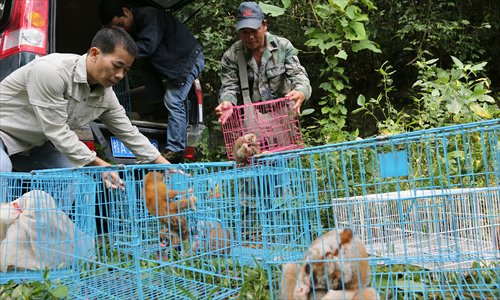HOME >> CHINA
'Mercy' releases cause environmental damage, animal deaths
Source:Global Times Published: 2015-11-25 19:18:01

People from Puer, Yunnan Province release 93 animals, including macaques and golden eagles in the local nature reserve on April 24. Photo: CFP
Half of around 1,000 small animals, including foxes and minks, that were freed in the village of Qiongtai in East China's Zhejiang Province died after little more than a week, triggering nationwide criticism over the poorly thought-out release.
The animals were released in the village on November 14. Villagers have found over a half of them dead while the rest have been disturbing locals' lives. They suspect that the animals may have be freed by Buddhists who bought them from livestock farms, Zhejiang-based newspaper the Hangzhou Daily reported Saturday.
Such "mercy" releases are when people such as animal-lovers or Buddhists buy animals and subsequently free them.
Similar releases have been reported across the nation. A Friday report from news website thepaper.cn said that a man from Hangzhou spent 1.5 million yuan ($234,750) on 100,000 crabs and vowed to set them free.
However, analysts pointed out these apparently merciful acts may not only lead to the deaths of animals, but also can cause environmental problems and inconvenience for other people.
Dead or wild
"At least a half of the released animals died on the roads. They became stinky after two days," said Chen Xianzhao, head of the village, adding that the animals might have been unaccustomed to the local weather or failed to find food.
As for those who are still alive, some of them have remained in the village area and have damaged locals' property. A villager named Wang Youtang claimed that he had to eat chickens and ducks which were supposed to be sold at market as they were killed by the released animals.
In August 2014, a picture in the Nandu Daily showing a woman releasing venomous snakes in a park in Guangdong Province went viral online, with many accusing her of putting people at risk.
Harming the environment
Mercy releases have not only disturbed lives, but also threatened ecosystems.
According to a report from the Yangtze Evening News in January, a group of animal welfare activists poured large numbers of snails into the Grand Canal in Zhejiang, leading to the death of the snails and damaging the local ecosystem.
The Beijing News reported in September last year that some Beijing residents released bullfrogs in Olympic Forest Park. However, Xie Yan, an expert from the Chinese Academy of Sciences, said that bullfrog are able to reproduce quickly and as an alien species they will likely destroy the ecological balance of the park by eating the eggs of both fish and frogs.
Beijing authorities have released new landscape and forestry regulations, which stipulate that people who release animals in national wetlands will be fined up to 500,000 yuan.
Chain of cheaters
These well-meaning charitable gestures have also led to a dishonest supply chain.
According to a report from Beijing Evening News in September 2014, large numbers of bird traffickers in Beijing gather in the city's Badachu Park to illegally sell birds to bird-lovers who then often release them.
A trafficker surnamed Jiang told the newspaper that the birds he sells are wild animals and their survival rate is very high. Moreover, he claimed there was little chance of them being re-captured. Jiang sells sparrows for 5 yuan each, while a couple of magpies costs around 50 yuan.
However, the reporter wrote that after animal-lovers released the birds, Jiang lured them back with food and re-caged them.
Workers at the park told the newspaper that although they have banned visitors from setting birds free, some still sneak birds into the park. "We try to persuade people to not release these birds. 70 percent of them end up dead," the worker said.
Some bird traffickers said that they usually sell many birds to bird-lovers at once. "A bird-lover bought 30,000 birds from me... (we) immediately released the birds," a bird seller surnamed Ouyang told the newspaper.
In China, people who release animals are common across the country and are active on online platforms such as QQ instant messaging groups and tieba.com online forums. One of those enthusiasts told the newspaper that he releases animals every day including birds, fish, insects, and even snapping turtles.
Some animal-lovers have hit back at their critics, saying that some make an effort to help released creatures when they return to the wild.
"After releasing animals, we will also feed them. We would take animals' living environment into consideration. Some of them might die eventually, but I think it is better for them than being killed and consumed," a worker from Lingguang Temple in Badachu Park, who organizes such releases once a month, told the Global Times Wednesday.
Newspaper headline: Free to die
Posted in: Society